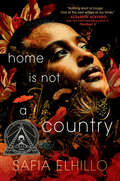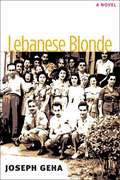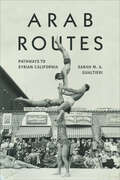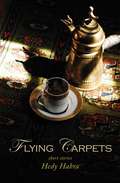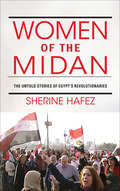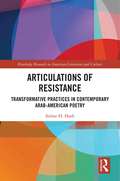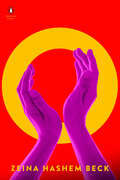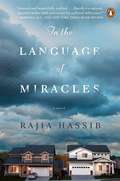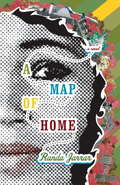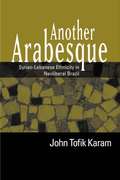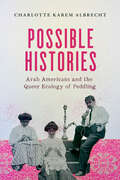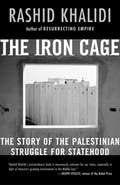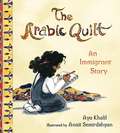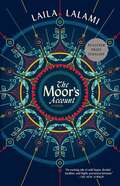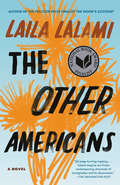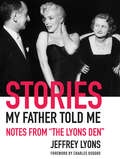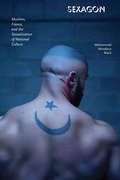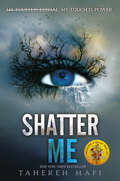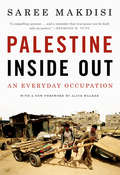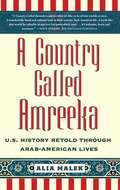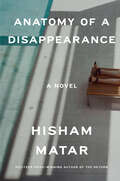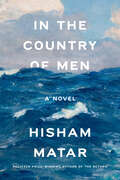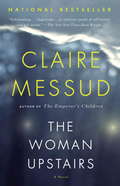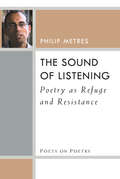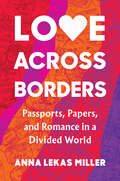Special Collections
Arab American Book Award
- Table View
- List View
Home Is Not a Country
by Safia ElhilloA mesmerizing novel in verse about family, identity, and finding yourself in the most unexpected places--for fans of The Poet X, I Am Not Your Perfect Mexican Daughter, and Jason Reynolds.
Nima doesn't feel understood. By her mother, who grew up far away in a different land. By her suburban town, which makes her feel too much like an outsider to fit in and not enough like an outsider to feel like that she belongs somewhere else. At least she has her childhood friend Haitham, with whom she can let her guard down and be herself. Until she doesn't.
As the ground is pulled out from under her, Nima must grapple with the phantom of a life not chosen, the name her parents didn't give her at birth: Yasmeen. But that other name, that other girl, might just be more real than Nima knows. And more hungry. And the life Nima has, the one she keeps wishing were someone else's. . .she might have to fight for it with a fierceness she never knew she had."
Nothing short of magic...One of the best writers of our times."-- Elizabeth Acevedo, New York Times Bestselling author of The Poet X
Lebanese Blonde
by Joseph GehaLebanese Blonde takes place in 1975-76 at the beginning of Lebanon's sectarian civil war.
Set primarily in the Toledo, Ohio, "Little Syria" community, it is the story of two immigrant cousins: Aboodeh, a self-styled entrepreneur; and Samir, his young, reluctant accomplice.
Together the two concoct a scheme to import Lebanese Blonde, a potent strain of hashish, into the United States, using the family's mortuary business as a cover.
When Teyib, a newly arrived war refugee, stumbles onto their plans, his clumsy efforts to gain acceptance raise suspicion. Who is this mysterious "cousin," and what dangers does his presence pose?
Aboodeh and Samir's problems grow still more serious when a shipment goes awry and their links to the war-ravaged homeland are severed.
Soon it's not just Aboodeh and Samir's livelihoods and futures that are imperiled, but the stability of the entire family.
Arab Routes
by Sarah GualtieriLos Angeles is home to the largest population of people of Middle Eastern origin and descent in the United States. Since the late nineteenth century, Syrian and Lebanese migration, in particular, to Southern California has been intimately connected to and through Latin America. Arab Routes uncovers the stories of this Syrian American community, one both Arabized and Latinized, to reveal important cross-border and multiethnic solidarities in Syrian California. Sarah M. A. Gualtieri reconstructs the early Syrian connections through California, Texas, Mexico, and Lebanon. She reveals the Syrian interests in the defense of the Mexican American teens charged in the 1942 Sleepy Lagoon murder, in actor Danny Thomas's rise to prominence in LA's Syrian cultural festivals, and in more recent activities of the grandchildren of immigrants to reclaim a sense of Arabness. Gualtieri reinscribes Syrians into Southern California history through her examination of powerful images and texts, augmented with interviews with descendants of immigrants. Telling the story of how Syrians helped forge a global Los Angeles, Arab Routes counters a long-held stereotype of Arabs as outsiders and underscores their longstanding place in American culture and in interethnic coalitions, past and present.
Flying Carpets
by Hedy HabraFlying Carpets is a story collection in the grand tradition of Arab storytelling. In it, Habra masterfully waves her writing wand and takes us on a journey as we read about people and places far away and encounter temples and mountain villages, gliding boats and fragrant kitchens, flaming fish and rich tapestries.
The stories recover lost, partially forgotten and imaginary spaces, progressing from the concrete to the universal. The first two sections move between Egypt and Lebanon with a touch of magic realism. In the second half of the collection, the characters become less rooted in time and space as the dreamlike elements intensify. Throughout the book, storytelling and fortunetelling evoke a mythical past that is at the same time lost yet alive: love, loss, the yearning for alternate worlds, and the need to reinvent oneself through art permeate its pages.
Women of the Midan
by Sherine HafezAn exploration of gender, the Arab Spring, and women&’s experiences of revolution, including firsthand accounts. In Women of the Midan, Sherine Hafez demonstrates how women were a central part of revolutionary process of the Arab Spring. Women not only protested in the streets of Cairo, they demanded democracy, social justice, and renegotiation of a variety of sociocultural structures. Women&’s resistance to state control, Islamism, neoliberal market changes, the military establishment, and patriarchal systems forged new paths of dissent and transformation. Through firsthand accounts of women who participated in the revolution, Hafez illustrates how the gendered body signifies collective action and the revolutionary narrative. Using the concept of rememory, Hafez shows how the body is inseparably linked to the trauma of the revolutionary struggle. While delving into the complex weave of public space, government control, masculinity, and religious and cultural norms, Hafez sheds light on women&’s relationship to the state in the Arab world today and how the state, in turn, shapes individuals and marks gendered bodies.
Articulations of Resistance
by Sirene HarbUsing a theoretical framework located at the intersection of US ethnic studies, transnational studies, and postcolonial studies, Articulations of Resistance: Transformative Practices in Arab-American Poetry maps an interdisciplinary model of critical inquiry to demonstrate the intimate link and multilayered connections between poetry and resistance. In this study of contemporary Arab-American poetry, Sirène Harb analyzes how resistance, defined as the force challenging the dominant, intervenes in ways of rethinking the local and the global vis-à-vis traditional paradigms of time, space, language and value.
O
by Zeina Hashem Beck&“O is so full of music and passion for life . . . Zeina Hashem Beck&’s poems unfold the abundance of our world.&” —Ilya Kaminsky, author of Deaf Republic From a "brilliant, absolutely essential voice" whose "poems feel like whole worlds" (Naomi Shihab Nye), a poetry collection considering the body physical, the body politic, and the body sacredZeina Hashem Beck writes at the intersection of the divine and the profane, where she crafts elegant, candid poems that simultaneously exude a boundless curiosity and a deep knowingness. Formally electrifying—from lyrics and triptychs to ghazals and Zeina's own duets, in which English and Arabic echo and contradict each other—O explores the limits of language, notions of home and exile, and stirring visions of motherhood, memory, and faith.
In the Language of Miracles
by Rajia HassibFor readers of House of Sand and Fog, a mesmerizing debut novel of an Egyptian American family and the wrenching tragedy that tears their lives apart
Samir and Nagla Al-Menshawy appear to have attained the American dream. After immigrating to the United States from Egypt, Samir successfully works his way through a residency and launches his own medical practice as Nagla tends to their firstborn, Hosaam, in the cramped quarters of a small apartment. Soon the growing family moves into a big house in the manicured New Jersey suburb of Summerset, where their three children eventually attend school with Natalie Bradstreet, the daughter of their neighbors and best friends.
More than a decade later, the family's seemingly stable life is suddenly upended when a devastating turn of events leaves Hosaam and Natalie dead and turns the Al-Menshawys into outcasts in their own town.
Narrated a year after Hosaam and Natalie's deaths, Rajia Hassib's heartfelt novel follows the Al-Menshawys during the five days leading up to the memorial service that the Bradstreets have organized to mark the one-year anniversary of their daughter's death. While Nagla strives to understand her role in the tragedy and Samir desperately seeks reconciliation with the community, Khaled, their surviving son, finds himself living in the shadow of his troubled brother.
Struggling under the guilt and pressure of being the good son, Khaled turns to the city in hopes of finding happiness away from the painful memories home conjures. Yet he is repeatedly pulled back home to his grandmother, Ehsan, who arrives from Egypt armed with incense, prayers, and an unyielding determination to stop the unraveling of her daughter's family.
In Ehsan, Khaled finds either a true hope of salvation or the embodiment of everything he must flee if he is ever to find himself.
Writing with unflinchingly honest prose, Rajia Hassib tells the story of one family pushed to the brink by tragedy and mental illness, trying to salvage the life they worked so hard to achieve. The graceful, elegiac voice of In the Language of Miracles paints tender portraits of a family's struggle to move on in the wake of heartbreak, to stay true to its traditions, and above all else, to find acceptance and reconciliation
A Map of Home
by Randa JarrarNidali, the rebellious daughter of an Egyptian-Greek mother and a Palestinian father, narrates the story of her childhood in Kuwait, her teenage years in Egypt (to where she and her family fled the 1990 Iraqi invasion), and her family's last flight to Texas. Nidali mixes humor with a sharp, loving portrait of an eccentric middle-class family, and this perspective keeps her buoyant through the hardships she encounters: the humiliation of going through a checkpoint on a visit to her father's home in the West Bank; the fights with her father, who wants her to become a famous professor and stay away from boys; the end of her childhood as Iraq invades Kuwait on her thirteenth birthday; and the scare she gives her family when she runs away from home. Funny, charming, and heartbreaking, A Map of Home is the kind of book Tristram Shandy or Huck Finn would have narrated had they been born Egyptian-Palestinian and female in the 1970s.
Another Arabesque
by Karam and John TofikOffering a novel approach to the study of ethnicity in the neoliberal market,Another Arabesqueis the first full-length book in English to focus on the estimated seven million Arabs in Brazil. With insights gained from interviews and fieldwork, John Tofik Karam examines how Brazilians of Syrian-Lebanese descent have gained greater visibility and prominence as the country has embraced its globalizing economy, particularly its relations with Arab Gulf nations. At the same time, he recounts how Syrian-Lebanese descendents have increasingly self-identified as "Arabs. " Karam demonstrates how Syrian-Lebanese ethnicity in Brazil has intensified through market liberalization, government transparency, and consumer diversification. Utilizing an ethnographic approach, he employs current social and business phenomena as springboards for investigation and discussion. Uncovering how Arabness appears in places far from the Middle East,Another Arabesquemakes a new and valuable contribution to the study of how identity is formed and shaped in the modern world.
Possible Histories
by Charlotte Karem AlbrechtA free ebook version of this title is available through Luminos, University of California Press’s Open Access publishing program. Visit www.luminosoa.org to learn more. Many of the hundreds of thousands of Syrians who immigrated to the US beginning in the 1870s worked as peddlers. Men were able to transgress Syrian norms related to marriage practices while they were traveling, while Syrian women accessed more economic autonomy though their participation in peddling networks. In Possible Histories, Charlotte Karem Albrecht explores this peddling economy of the late nineteenth and early twentieth centuries as a site for revealing how dominant ideas about sexuality are imbricated in Arab American racial histories. Karem Albrecht marshals a queer affective approach to community and family history to show how Syrian immigrant peddlers and their interdependent networks of labor and care appeared in interconnected discourses of modernity, sexuality, gender, class, and race. Possible Histories conceptualizes this profession, and its place in narratives of Arab American history, as a "queer ecology" of laboring practices, intimacies, and knowledge production. This book ultimately proposes a new understanding of the long arm of Arab American history that puts sexuality and gender at the heart of ways of navigating US racial systems.
The Iron Cage
by Rashid KhalidiKhalidi (Arab studies, Columbia U.) explains why the Palestinians failed to achieve independence prior to 1948, the date of the establishment of Israel. Rather than "compare the incomparable"--the Palestinians and the Zionist movement--he provides thematically comparisons of the Palestinians to other Arab societies at analogous stages of development. His major themes include the failure of the Palestinians to successfully challenge the legal structure of the mandatory regime, which was consciously designed to prevent Palestinian self-government; the role of British-created religious structures in co-opting Palestinian elites; and the structural failures of the revolt of 1936-39.
The Arabic Quilt
by Aya KhalilKanzi’s family has moved from Egypt to America, and on her first day in a new school, what she wants more than anything is to fit in. Maybe that’s why she forgets to take the kofta sandwich her mother has made for her lunch, but that backfires when Mama shows up at school with the sandwich. Mama wears a hijab and calls her daughter Habibti (dear one). When she leaves, the teasing starts.
That night, Kanzi wraps herself in the beautiful Arabic quilt her teita (grandma) in Cairo gave her and writes a poem in Arabic about the quilt. Next day her teacher sees the poem and gets the entire class excited about creating a “quilt” (a paper collage) of student names in Arabic. In the end, Kanzi’s most treasured reminder of her old home provides a pathway for acceptance in her new one.
This authentic story with beautiful illustrations includes a glossary of Arabic words and a presentation of Arabic letters with their phonetic English equivalents.
Advisory: Bookshare has learned that this book offers only partial accessibility. We have kept it in the collection because it is useful for some of our members. Benetech is actively working on projects to improve accessibility issues such as these.
The Moor's Account
by Laila LalamiIn this sweeping historical saga of a young man's journey from successful merchant to slave to triumphant survivor, Laila Lalami has crafted "brilliantly imagined fiction...rewritten to give us something that feels very like the truth" (Salman Rushdie).
In 1527, the conquistador Pánfilo de Narváez left the port of San Lucar de Barrameda in Spain with a crew of more than five hundred men. His goal was to claim what is now the Gulf Coast of the United States for the Spanish crown and, in the process, become as wealthy and as famous as Hernán Cortés.
But from the moment the Narváez expedition reached Florida it met with incredibly bad luck - storms, disease, starvation, hostile Indians. Within a year, there were only four survivors: the expedition's treasurer, Cabeza de Vaca; a Spanish nobleman named Alonso del Castillo Maldonado; a young explorer by the name of Andrés Dorantes; and his Moroccan slave, Mustafa al-Zamori.
The four survivors were forced to live as slaves to the Indians for six years, before fleeing and establishing themselves as faith healers. Together, they traveled on foot through present-day Florida, Texas, New Mexico, and Arizona, gathering thousands of disciples and followers along the way. In 1536, they crossed the Rio Grande into Mexican territory, where they stumbled on a group of Spanish slavers, who escorted them to the capital of the Spanish empire, México-Tenochtitlán.
Three of the survivors were asked to provide testimony of their journey--Castillo, Dorantes, and Cabeza de Vaca, who later wrote a book about this adventure, called La Relacíon, or The Account. But because he was a slave, Estebanico was not asked to testify.
His experience was considered irrelevant, or superfluous, or unreliable, or unworthy, despite the fact that he had acted as a scout, an interpreter, and a translator.
This novel is his story.
The Other Americans
by Laila LalamiFrom the Pulitzer Prize finalist and author of The Moor’s Account, here is a timely and powerful novel about the suspicious death of a Moroccan immigrant—at once a family saga, a murder mystery, and a love story, informed by the treacherous fault lines of American culture. Late one spring night, Driss Guerraoui, a Moroccan immigrant living in California, is walking across a darkened intersection when he is killed by a speeding car. The repercussions of his death bring together a diverse cast of characters: Guerraoui’s daughter Nora, a jazz composer who returns to the small town in the Mojave she thought she'd left for good; his widow, Maryam, who still pines after her life in the old country; Efraín, an undocumented witness whose fear of deportation prevents him from coming forward; Jeremy, an old friend of Nora's and an Iraq War veteran; Coleman, a detective who is slowly discovering her son's secrets; Anderson, a neighbor trying to reconnect with his family; and the murdered man himself. As the characters—deeply divided by race, religion, and class—tell their stories, connections among them emerge, even as Driss’s family confronts its secrets, a town faces its hypocrisies, and love, messy and unpredictable, is born.
Stories My Father Told Me
by Charles Osgood and Jeffrey LyonsThis amazing collection of choice anecdotes takes us right back to the Golden Age of New York City nightlife, when top restaurants like Toots Shor's, "21," and Sardi's, as well as glittering nightclubs like the Stork Club, Latin Quarter, and El Morocco, were the nightly gathering spots for great figures of that era: movie and Broadway stars, baseball players, champion boxers, comedians, diplomats, British royalty, prize-winning authors, and famous painters. From Charlie Chaplin to Winston Churchill, from Ethel Barrymore to Sophia Loren, from George Burns to Ernest Hemingway, from Joe DiMaggio to the Duke of Windsor: Leonard Lyons knew them all. For forty glorious years, from 1934 to 1974, he made the daily rounds of Gotham nightspots, collecting the exclusive scoops and revelations that were at the core of his famous newspaper column, "The Lyons Den."In this entertaining volume Jeffrey Lyons has assembled a considerable compilation of anecdotes from his father's best columns, and has also contributed a selection of his own interviews with stars of today, including Penélope Cruz and George Clooney, among others. Organized chronologically by decade and subdivided by celebrity, Stories My Father Told Me offers fascinating, amusing stories that are illustrated by approximately seventy photographs. He so captured the tenor of those exciting times that the great Lincoln biographer Carl Sandburg said: "Imagine how much richer American history would have been had there been a Leonard Lyons in Lincoln's time."
Sexagon
by Mehammed Amadeus MackHonorable Mention, Association for Middle East Women’s StudiesHonorable Mention, 2018 Arab American Book Awards (Non-Fiction)In contemporary France, particularly in the banlieues of Paris, the figure of the young, virile, hypermasculine Muslim looms large. So large, in fact, it often supersedes liberal secular society’s understanding of gender and sexuality altogether. Engaging the nexus of race, gender, nation, and sexuality, Sexagon studies the broad politicization of Franco-Arab identity in the context of French culture and its assumptions about appropriate modes of sexual and gender expression, both gay and straight.Surveying representations of young Muslim men and women in literature, film, popular journalism, television, and erotica as well as in psychoanalysis, ethnography, and gay and lesbian activist rhetoric, Mehammed Amadeus Mack reveals the myriad ways in which communities of immigrant origin are continually and consistently scapegoated as already and always outside the boundary of French citizenship regardless of where the individuals within these communities were born. At the same time, through deft readings of—among other things—fashion photography and online hook-up sites, Mack shows how Franco-Arab youth culture is commodified and fetishized to the point of sexual fantasy.Official French culture, as Mack suggests, has judged the integration of Muslim immigrants from North and West Africa—as well as their French descendants—according to their presumed attitudes about gender and sexuality. More precisely, Mack argues, the frustrations consistently expressed by the French establishment in the face of the alleged Muslim refusal to assimilate is not only symptomatic of anxieties regarding changes to a “familiar” France but also indicative of an unacknowledged preoccupation with what Mack identifies as the “virility cultures” of Franco-Arabs, rendering Muslim youth as both sexualized objects and unruly subjects.The perceived volatility of this banlieue virility serves to animate French characterizations of the “difficult” black, Arab, and Muslim boy—and girl—across a variety of sensational newscasts and entertainment media, which are crucially inflamed by the clandestine nature of the banlieues themselves and non-European expressions of virility. Mirroring the secret and underground qualities of “illegal” immigration, Mack shows, Franco-Arab youth increasingly choose to withdraw from official scrutiny of the French Republic and to thwart its desires for universalism and transparency. For their impenetrability, these sealed-off domains of banlieue virility are deemed all the more threatening to the surveillance of mainstream French society and the state apparatus.
Shatter Me
by Tahereh Mafi"You can't touch me," I whisper. I'm lying, is what I don't tell him. He can touch me, is what I'll never tell him. But things happen when people touch me. Strange things. Bad things. No one knows why Juliette's touch is fatal, but The Reestablishment has plans for her. Plans to use her as a weapon. But Juliette has plans of her own. After a lifetime without freedom, she's finally discovering a strength to fight back for the very first time-and to find a future with the one boy she thought she'd lost forever.
Palestine Inside Out
by Alice Walker and Saree MakdisiTending one's fields, visiting a relative, going to the hospital: for ordinary Palestinians, such activities require negotiating permits and passes, curfews and closures, "sterile roads" and "seam zones"--bureaucratic hurdles ultimately as deadly as outright military incursion.
In Palestine Inside Out, Saree Makdisi draws on eye-opening statistics, academic histories, UN reports, and contemporary journalism to reveal how the "peace process" institutionalized Palestinians' loss of control over their inner and outer lives--and argues powerfully and convincingly for a one-state solution.
A Country Called Amreeka
by Alia MalekAmong the surfeit of narratives about Arabs that have been published in recent years, surprisingly little has been reported on Arabs in America -- an increasingly relevant issue.
This book is the most powerful approach imaginable: it is the story of the last forty-plus years of American history, told through the eyes of Arab Americans. It begins in 1963, before major federal legislative changes seismically transformed the course of American immigration forever. Each chapter describes an event in U. S. history -- which may already be familiar to us -- and invites us to live that moment in time in the skin of one Arab American.
The chapters follow a timeline from 1963 to the present, and the characters live in every corner of this country. These are dramatic narratives, describing the very human experiences of love, friendship, family, courage, hate, and success. There are the timeless tales of an immigrant community becoming American, the nostalgia for home, the alienation from a society sometimes as intolerant as its laws are generous. A Country Called Amreeka's snapshots allow us the complexity of its characters' lives with an impassioned narrative normally found in fiction. Read separately, the chapters are entertaining and harrowing vignettes; read together, they add a new tile to the mosaic of our history.
We meet fellow Americans of all creeds and colors, among them the Alabama football player who navigates the stringent racial mores of segregated Birmingham, where a church bombing wakes a nation to the need to make America a truly more equal place; the young wife from Ramallah -- now living in Baltimore -- who had to abandon her beautiful home and is now asked by a well-meaning American, "How do you like living in an apartment after living in a tent?"; the Detroit toughs and the potsmoking suburban teenagers, who in different decades become politicized and serious about their heritage despite their own wills; the homosexual man afraid to be gay in the Arab world and afraid to be Arab in America; the two formidable women who wind up working for opposing campaigns in the 2000 presidential election; the Marine fighting in Iraq who meets villagers who ask him, "What are you, an Arab, doing here?"
We glimpse how America sees Arabs as much as how Arabs see America. We revisit the 1973 oil embargo that initiated the American perception of all Arabs as oil-rich sheikhs; the 1979 Iranian hostage crisis that heralded the arrival of Middle Eastern Islam in the American consciousness; bombings across three decades in Los Angeles, Oklahoma City, and New York City that bring terrorism to American soil; and both wars in Iraq that have posed Arabs as the enemies of America. In a post-9/11 world, Arabic names are everywhere in America, but our eyes glaze over them; we sometimes don't know how to pronounce them or understand whence they come.
A Country Called Amreeka gives us the faces behind those names and tells the story of a community it has become essential for us to understand. We can't afford to be oblivious.
Anatomy of a Disappearance
by Hisham MatarThis mesmerizing literary novel is written with all the emotional precision and intimacy that have won Hisham Matar tremendous international recognition. In a voice that is delicately wrought and beautifully tender, he asks: When a loved one disappears, how does that absence shape the lives of those who are left?
Nuri is a young boy when his mother dies. It seems that nothing will fill the emptiness her death leaves behind in the Cairo apartment he shares with his father—until they meet Mona, sitting in her yellow swimsuit by the pool of the Magda Marina hotel.
As soon as Nuri sees Mona, the rest of the world vanishes. But it is Nuri’s father with whom Mona falls in love and whom she eventually marries. Their happiness consumes Nuri to the point where he wishes his father would disappear. Nuri will, however, soon regret what he’s wished for.
When his father, a dissident in exile from his homeland, is abducted under mysterious circumstances, the world that Nuri and his stepmother share is shattered. And soon they begin to realize how little they knew about the man they both loved.
In the Country of Men
by Hisham MatarLibya, 1979.
Nine-year-old Suleiman’s days are circumscribed by the narrow rituals of childhood: outings to the ruins surrounding Tripoli, games with friends played under the burning sun, exotic gifts from his father’s constant business trips abroad.
But his nights have come to revolve around his mother’s increasingly disturbing bedside stories full of old family bitterness. And then one day Suleiman sees his father across the square of a busy marketplace, his face wrapped in a pair of dark sunglasses. Wasn’t he supposed to be away on business yet again? Why is he going into that strange building with the green shutters? Why did he lie?
Suleiman is soon caught up in a world he cannot hope to understand—where the sound of the telephone ringing becomes a portent of grave danger; where his mother frantically burns his father’s cherished books; where a stranger full of sinister questions sits outside in a parked car all day; where his best friend’s father can disappear overnight, next to be seen publicly interrogated on state television.
In the Country of Men is a stunning depiction of a child confronted with the private fallout of a public nightmare. But above all, it is a debut of rare insight and literary grace.
The Woman Upstairs
by Claire MessudNora Eldridge, a 37-year-old elementary school teacher in Cambridge, Massachusetts, is on the verge of disappearing. Having abandoned her desire to be an artist, she has become the "woman upstairs," a reliable friend and tidy neighbour always on the fringe of others' achievements. Then into her classroom walks a new pupil, Reza Shahid, a child who enchants as if from a fairy tale. He and his parents--dashing Skandar, a half-Muslim Professor of Ethical History born in Beirut, and Sirena, an effortlessly glamorous Italian artist--have come to America for Skandar to teach at Harvard.But one afternoon, Reza is attacked by schoolyard bullies who punch, push and call him a "terrorist," and Nora is quickly drawn deep into the complex world of the Shahid family. Soon she finds herself falling in love with them, separately and together. Nora's happiness explodes her boundaries--until Sirena's own ambition leads to a shattering betrayal.Written with intimacy and piercing emotion, this urgently dispatched story of obsession and artistic fulfillment explores the thrill--and the devastating cost--of giving in to one's passions. The Woman Upstairs is a masterly story of America today, of being a woman and of the exhilarations of love.
The Sound of Listening
by Philip MetresPhilip Metres stakes a claim for the cultural work that poems can perform—from providing refuge to embodying resistance, from recovering silenced voices to building a more just world, in communities of solitude and solidarity. Gathering a decade of his writing on poetry, he widens our sense of poetry as a way of being in the world, proposing that poems can offer a permeability to marginalized voices and a shelter from the imperial noise and despair that can silence us. The Sound of Listening ranges between expansive surveys of the poetry of 9/11, Arab American poetry, documentary poetry, landscape poetry, installation poetry, and peace poetry; personal explorations of poets such as Adrienne Rich, Khalil Gibran, Lev Rubinstein, and Arseny Tarkovsky; and intimate dialogues with Randa Jarrar, Fady Joudah, and Micah Cavaleri, that illuminate Metres’s practice of listening in his 2015 work, Sand Opera.
Love Across Borders
by Anna Lekas MillerWe are told that love conquers all, but what happens when you don&’t have the right passport? With deep empathy, rigorous reporting, and the irresistible perspective of a true romantic, journalist Anna Lekas Miller tells the stories of couples around the world who must confront Kafkaesque immigration systems to be together—as she did to be with her partner. Written with suspenseful storytelling worthy of the greatest love stories, Love Across Borders takes readers across contentious frontiers around the world, from Turkey to Iraq, Syria to Greece, Mexico to the United States, to reveal the widespread prejudicial laws intent on dividing people. Lekas Miller tells her own story of meeting and falling deeply in love with Salem Rizk, in Istanbul, where they were both reporting on the Syrian War. But when Turkey started cracking down on refugees, Salem, who is Syrian, wasn&’t allowed to stay in the country, nor could he safely return to Syria. He was a man without a country. So Lekas Miller had to decide her next move: she has an American passport, but deep personal ties to the Middle East, and knew it was unfair that Salem couldn&’t travel freely the way she could. More important, she loved him. Over the next few years, as they navigated Salem&’s asylum claims, the United States&’ Muslim ban, and labyrinthine regulations in several different countries, Lekas Miller learned about—and bonded with—other people whose spouses had been deported, who found love in refugee camps, whose differing immigration statuses caused complicated power dynamics and financial hardship or threatened the wellbeing of their children. Here, offering a uniquely diverse, international, and intimate look at the global immigration crisis, she interweaves these rich, complicated love stories with a fascinating look at the history of passports (a surprisingly recent institution), the legacy of colonialism, and the discriminatory laws shaping how people move through the world every day. Ultimately, she builds a powerful, moving case for a borderless society—one where a border patrol agent can&’t keep anyone&’s love story from its happy ending
